#Microsoft Cloud Products
Explore tagged Tumblr posts
Text
youtube
#Buy Azure Subscriptions#Azure Subscriptions#Azure#Cloud Computing#Cloud Migration#Microsoft Cloud Products#Cloud Solutions#Cloud Consulting#Cloud Solution Provider#digital transformation#Youtube
0 notes
Text
Microsoft Empowers Customers to Build AI Agents for Routine Tasks
Microsoft is gearing up to let its customers create their own AI agents next month, and it’s a big deal! This is a total game changer from the usual chatbots. These new agents will need very little human help, which means businesses can breeze through their usual tasks a lot faster. What Are Autonomous AI Agents? Unlike basic chatbots that just answer specific questions, these cool autonomous…
#AI in business#AI Innovation#Autonomous Agents#Big corporates#Brad Smith#Business Efficiency#Business solutions#Cloud Infrastructure#Co-pilot Studio#customer service operations#data center hubs in Europe#Digital Transformation#Giorgia Meloni#increase business productivity#Italy#McKinsey & Co#Microsoft AI#sales businesses#Salesforce#small businesses#Tech Investment#the Mediterranean
0 notes
Text
Explore the most popular Azure services and products of 2024. This list outlines the top tools and services businesses rely on for cloud computing, data management, AI, and security, helping you make informed technology choices.
#Azure services 2024#top Azure products#Microsoft Azure cloud#cloud computing with Azure#popular Azure tools.
0 notes
Text
Unlock the Full Potential of Microsoft 365 with Office 365 for IT Pros

Are you an IT professional looking to streamline your organization's operations and maximize the power of Microsoft 365? Then look no further than Office 365 for IT Pros (2025 Edition). This comprehensive guide is your ultimate companion to mastering the intricacies of Microsoft 365 and automating tasks with PowerShell.
Why You Need This Book
• Comprehensive Coverage: Delve deep into essential business productivity features like Teams, Microsoft 365 Groups, Stream, Planner, Power Automate, Power Apps, Exchange Online, SharePoint Online, Viva Engage, and OneDrive for Business.
• PowerShell Automation: Learn to automate repetitive tasks and streamline your workflow with PowerShell, saving you valuable time and effort.
• Up-to-Date Information: Stay ahead of the curve with the latest features and best practices for Microsoft 365.
• Expert Guidance: Benefit from the insights of seasoned IT professionals who have years of experience working with Microsoft 365.
What Sets This Book Apart
• Practical Examples: Real-world examples and step-by-step instructions make it easy to apply the concepts to your own environment.
• In-Depth Coverage: Go beyond the basics and explore advanced topics like security, compliance, and hybrid deployments.
• Continuous Updates: As a subscription service, you'll always have access to the latest updates and information.
Who Should Read This Book?
• IT administrators
• System engineers
• Cloud architects
• Anyone looking to enhance their Microsoft 365 skills
Don't Miss Out
Office 365 for IT Pros (2025 Edition) is more than just a book; it's your roadmap to becoming a Microsoft 365 expert. Take control of your organization's productivity and efficiency today.
• Visit our website to learn more and purchase your copy:
Unlock the Full Potential of Microsoft 365 with Office 365 for IT Pros
1 note
·
View note
Text
My First Impressions of the M4 iPad Pro
I’ve had the new M4 iPad Pro for just three days, and I already love it. This device has the potential to replace my MacBook Pro for my daily work tasks, which include managing emails, writing articles, and editing photos and videos. The M4 iPad Pro comes with several exciting updates: an enhanced OLED display, an AI-focused M4 processor, an incredibly thin design, and new accessories like the…

View On WordPress
#Accessories#Adobe Creative Cloud#AI processor#Apple Pencil Pro#Apple tablet#Audio Quality#barrel roll#battery life#Camera#connectivity#creative tools#Design#fast charging#Final Cut Pro#Find My#haptic feedback#High Performance#iPad Pro review#iPadOS#laptop replacement#LiDAR scanner#Lightweight#Logic Pro#M4 iPad Pro#Magic Keyboard#Microsoft Office#mobile productivity#multitasking#multitasking features#OLED display
0 notes
Text
Microsoft Office 365 The Productivity in Your Hands

In today's fast-paced and technologically-driven world, productivity is of utmost importance. With numerous tasks to juggle, deadlines to meet, and projects to complete, professionals are constantly searching for efficient solutions to manage their workload.
Microsoft Office 365 is one such solution that puts productivity directly in the hands of its users.
Office 365 encompasses a suite of popular productivity tools, including Word, Excel, PowerPoint, Outlook, and more. However, it goes beyond the traditional desktop software by offering cloud-based features and collaborative capabilities.
This means that users can access their documents, spreadsheets, and presentations anytime, anywhere, with any device, as long as they have an internet connection.
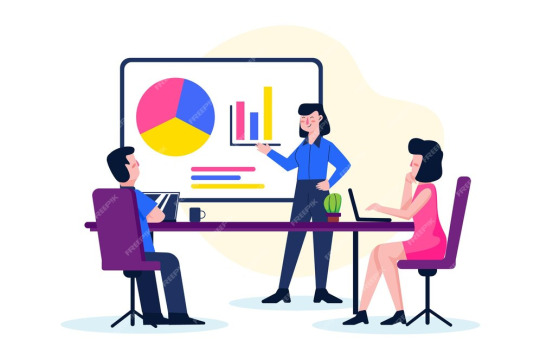
The flexibility offered by Office 365 allows individuals and teams to work remotely, ensuring that productivity is not limited by physical boundaries.
Whether you are at home, on the go, or in the office, you can easily collaborate with colleagues, share files, and engage in real-time communication. This eliminates the need for constant email exchanges, tedious version control, and delays in decision-making.
One of the key highlights of Office 365 is its real-time collaboration feature. Multiple users can work on the same document simultaneously, making editing, reviewing, and finalizing projects a seamless process.
Whether it is a group brainstorming session, a finance spreadsheet, or a marketing presentation, everyone can contribute and see updates in real-time.
This not only saves time but also enhances teamwork and fosters a sense of accountability.
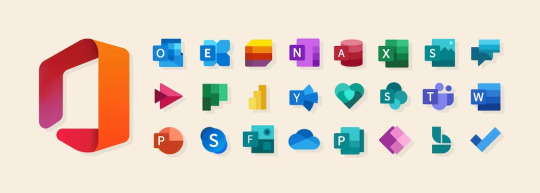
Furthermore, Office 365 offers integrated communication tools like Microsoft Teams, which facilitate efficient collaboration and streamline project management.
Users can create channels for specific topics, have virtual meetings, and chat in real-time. This ensures that team members are always connected, eliminating any communication barriers and allowing for quick decision-making and problem-solving.
Another significant advantage of Office 365 is its scalability and cost-efficiency. Users can choose from various subscription plans, tailored to meet the needs of different individuals and organizations.
This means that whether you are a freelancer, a small business owner, or part of a large corporation, Office 365 can be customized to suit your requirements.
Additionally, with automatic updates and continuous improvements, users always have access to the latest features and security enhancements without the need for manual installations or expensive upgrades.
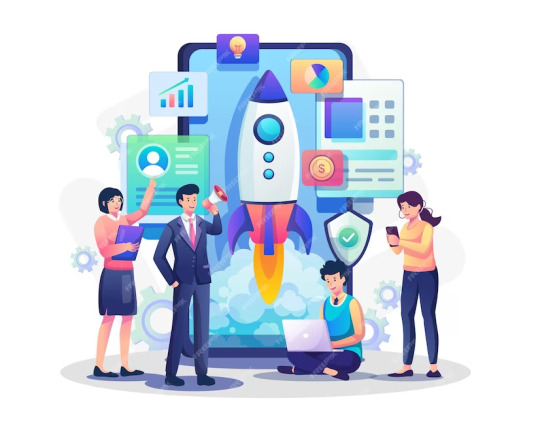
Some tips for getting the most out of Microsoft 365:
Take advantage of the training: Microsoft offers a variety of training resources for Microsoft 365. This training can help you learn how to use the applications more effectively.
Use the cloud: Microsoft 365 is available in the cloud, so you can access your applications and data from anywhere. This can be a great way to work from home or on the go.
Collaborate with others: Microsoft 365 makes it easy to collaborate with others on projects. Use features such as document sharing and real-time co-authoring to work together more effectively.
Use the latest features: Microsoft 365 is constantly being updated with new features. Make sure to check out the latest features to see how they can help you be more productive.

In conclusion, Microsoft Office 365 is a game-changer when it comes to boosting productivity. By providing users with cloud-based access, collaborative features, and integrated communication tools, Office 365 ensures that productivity is no longer confined to a physical workspace. It empowers individuals and teams to work efficiently, streamline workflows, and achieve more in less time. With Office 365, productivity truly is in the hands of its users, offering a seamless and powerful solution to manage the demands of the modern world.
#microsoft office 365#office 365#microsoft office#Microsoft 365#cloud-based#productivity tools#work flow#integrated communication tools#teamwork
0 notes
Text

Joy It Solution discovers the future of business transformation with Microsoft Cloud Solutions in India. Increase productivity and innovation with Azure, Microsoft 365, and Dynamics 365. With scalable cloud infrastructure, AI-driven insights, and collaboration tools, you can seamlessly adapt to the ever-evolving digital landscape. Maintain data security and compliance while increasing efficiency, agility, and cost-effectiveness.
#it staffing services in india#product information management solutions in india#low-code service provider in india#digital transformation partner in india#microsoft cloud solutions in india
0 notes
Text
Bangalore is a hub for IT companies, startups, and multinational corporations, making it an ideal location to study and work in the field of cybersecurity. The city boasts numerous educational institutions and training centers that offer comprehensive cybersecurity courses to cater to the growing demand for cybersecurity professionals.
#Course Bundles in India#Computer Support in Pune#Cybersecurity Courses in Banglore#Cybersecurity Courses Online#Networking Certifications in Hyderabad#CompTIA Courses Online in India#Microsoft Courses in India#Cisco Courses in Mumbai#Database Systems in pune#Blockchain Courses in Delhi#Programming DevOps in Banglore#Google Certifications in Pune#Google Certifications Online#Cloud Computing in Mumbai#Business & Management in India#Adobe Courses in Mumbai#Design Courses in Pune#Business Productivity in Banglore#Social Media Marketing in India#Microsoft Courses in Online
1 note
·
View note
Text
UnifyCloud India's Exclusive Offer: Excel Education Perpetual License

In today's fast-paced digital world, proficiency in Microsoft Excel is an indispensable skill. Whether you're a student looking to gain a competitive edge or a professional seeking to enhance your career prospects, having access to the right tools and resources is crucial. UnifyCloud India understands this need and has introduced an exclusive offering – the Excel Education Perpetual License. In this article, we'll delve into the details of this unique offer and how it can empower learners of all levels.
UnifyCloud India's Commitment to Education
UnifyCloud India is renowned for its commitment to empowering individuals and institutions through technology. With a strong focus on education, they have developed solutions to bridge the digital divide and provide accessible, high-quality tools for learning. Their Excel Education Perpetual License is a testament to this dedication.
What Is the Excel Education Perpetual License? The Excel Education Perpetual License is a specialized licensing option tailored for educational purposes. It is designed to provide students, teachers, and educational institutions with a cost-effective way to access Microsoft Excel, one of the most widely used spreadsheet software programs globally.
Key Features of the Excel Education Perpetual License Lifetime Access: Unlike subscription-based licenses that require ongoing payments, the Excel Education Perpetual License offers lifetime access to Microsoft Excel. Once you purchase it, you own the software indefinitely.
Full Functionality: This license provides access to the complete suite of features that Microsoft Excel offers. You can create, edit, analyze, and visualize data with ease.
Educational Pricing: UnifyCloud India has negotiated special pricing for students and educational institutions, making it affordable for learners at all levels.
Regular Updates: While perpetual licenses do not include feature updates like subscription-based models, UnifyCloud India may offer updates and patches to ensure the software remains compatible with modern systems.
Who Can Benefit from the Excel Education Perpetual License? Students: This license is ideal for students pursuing various fields of study. From basic data entry to advanced data analysis, Excel is a valuable tool that can enhance academic performance.
Educators: Teachers and professors can utilize Excel to create interactive lessons and perform data-driven research. The perpetual license ensures they always have access to the latest version.
Educational Institutions: Schools, colleges, and universities can acquire multiple licenses to equip their computer labs or provide students and faculty with the necessary tools for learning and research.
Professionals: Even professionals looking to boost their Excel skills can benefit from this offer. It's a cost-effective way to stay competitive in the job market or enhance productivity in the workplace.
How to Obtain the Excel Education Perpetual License To take advantage of this exclusive offer, visit the UnifyCloud India website or contact their sales team. They will guide you through the purchasing process and provide information on pricing, licensing options, and any additional services they offer.
Conclusion
UnifyCloud India's Excel Education Perpetual License is a game-changer for students, educators, and professionals alike. It offers lifetime access to one of the most powerful spreadsheet software tools at an affordable price. By investing in this perpetual license, you are investing in your education, career, and future success. Don't miss out on this exclusive opportunity to excel in Excel!
#Microsoft#Microsoft Excel#lTSC#Cloud Solution#Microsoft CSP#Azure Open AI#CSP Partner in India#Cloud Products#Managed Cloud Services#Solution Assessment
0 notes
Text

Confused about Google -
Workspace Plan
Start with Business Starter
₹1380 per user annually
.
.
.
VISIT FOR MORE : https://www.amyntas.in/
#email#googlecloud#gsuite#customeesupport#cloudworkspace#cloudstorage#google#gmail#productive#workspace#getit#technology#microsoft#googleworkspace#cloud#productivity#cloudstorageservices
0 notes
Text
“Disenshittify or Die”
youtube
I'm coming to BURNING MAN! On TUESDAY (Aug 27) at 1PM, I'm giving a talk called "DISENSHITTIFY OR DIE!" at PALENQUE NORTE (7&E). On WEDNESDAY (Aug 28) at NOON, I'm doing a "Talking Caterpillar" Q&A at LIMINAL LABS (830&C).

Last weekend, I traveled to Las Vegas for Defcon 32, where I had the immense privilege of giving a solo talk on Track 1, entitled "Disenshittify or die! How hackers can seize the means of computation and build a new, good internet that is hardened against our asshole bosses' insatiable horniness for enshittification":
https://info.defcon.org/event/?id=54861
This was a followup to last year's talk, "An Audacious Plan to Halt the Internet's Enshittification," a talk that kicked off a lot of international interest in my analysis of platform decay ("enshittification"):
https://www.youtube.com/watch?v=rimtaSgGz_4
The Defcon organizers have earned a restful week or two, and that means that the video of my talk hasn't yet been posted to Defcon's Youtube channel, so in the meantime, I thought I'd post a lightly edited version of my speech crib. If you're headed to Burning Man, you can hear me reprise this talk at Palenque Norte (7&E); I'm kicking off their lecture series on Tuesday, Aug 27 at 1PM.
==
What the fuck happened to the old, good internet?
I mean, sure, our bosses were a little surveillance-happy, and they were usually up for sharing their data with the NSA, and whenever there was a tossup between user security and growth, it was always YOLO time.
But Google Search used to work. Facebook used to show you posts from people you followed. Uber used to be cheaper than a taxi and pay the driver more than a cabbie made. Amazon used to sell products, not Shein-grade self-destructing dropshipped garbage from all-consonant brands. Apple used to defend your privacy, rather than spying on you with your no-modifications-allowed Iphone.
There was a time when you searching for an album on Spotify would get you that album – not a playlist of insipid AI-generated covers with the same name and art.
Microsoft used to sell you software – sure, it was buggy – but now they just let you access apps in the cloud, so they can watch how you use those apps and strip the features you use the most out of the basic tier and turn them into an upcharge.
What – and I cannot stress this enough – the fuck happened?!
I’m talking about enshittification.
Here’s what enshittification looks like from the outside: First, you see a company that’s being good to its end users. Google puts the best search results at the top; Facebook shows you a feed of posts from people and groups you followl; Uber charges small dollars for a cab; Amazon subsidizes goods and returns and shipping and puts the best match for your product search at the top of the page.
That’s stage one, being good to end users. But there’s another part of this stage, call it stage 1a). That’s figuring out how to lock in those users.
There’s so many ways to lock in users.
If you’re Facebook, the users do it for you. You joined Facebook because there were people there you wanted to hang out with, and other people joined Facebook to hang out with you.
That’s the old “network effects” in action, and with network effects come “the collective action problem." Because you love your friends, but goddamn are they a pain in the ass! You all agree that FB sucks, sure, but can you all agree on when it’s time to leave?
No way.
Can you agree on where to go next?
Hell no.
You’re there because that’s where the support group for your rare disease hangs out, and your bestie is there because that’s where they talk with the people in the country they moved away from, then there’s that friend who coordinates their kid’s little league car pools on FB, and the best dungeon master you know isn’t gonna leave FB because that’s where her customers are.
So you’re stuck, because even though FB use comes at a high cost – your privacy, your dignity and your sanity – that’s still less than the switching cost you’d have to bear if you left: namely, all those friends who have taken you hostage, and whom you are holding hostage
Now, sometimes companies lock you in with money, like Amazon getting you to prepay for a year’s shipping with Prime, or to buy your Audible books on a monthly subscription, which virtually guarantees that every shopping search will start on Amazon, after all, you’ve already paid for it.
Sometimes, they lock you in with DRM, like HP selling you a printer with four ink cartridges filled with fluid that retails for more than $10,000/gallon, and using DRM to stop you from refilling any of those ink carts or using a third-party cartridge. So when one cart runs dry, you have to refill it or throw away your investment in the remaining three cartridges and the printer itself.
Sometimes, it’s a grab bag:
You can’t run your Ios apps without Apple hardware;
you can’t run your Apple music, books and movies on anything except an Ios app;
your iPhone uses parts pairing – DRM handshakes between replacement parts and the main system – so you can’t use third-party parts to fix it; and
every OEM iPhone part has a microscopic Apple logo engraved on it, so Apple can demand that the US Customs and Border Service seize any shipment of refurb Iphone parts as trademark violations.
Think Different, amirite?
Getting you locked in completes phase one of the enshittification cycle and signals the start of phase two: making things worse for you to make things better for business customers.
For example, a platform might poison its search results, like Google selling more and more of its results pages to ads that are identified with lighter and lighter tinier and tinier type.
Or Amazon selling off search results and calling it an “ad” business. They make $38b/year on this scam. The first result for your search is, on average, 29% more expensive than the best match for your search. The first row is 25% more expensive than the best match. On average, the best match for your search is likely to be found seventeen places down on the results page.
Other platforms sell off your feed, like Facebook, which started off showing you the things you asked to see, but now the quantum of content from the people you follow has dwindled to a homeopathic residue, leaving a void that Facebook fills with things that people pay to show you: boosted posts from publishers you haven’t subscribed to, and, of course, ads.
Now at this point you might be thinking ‘sure, if you’re not paying for the product, you’re the product.'
Bullshit!
Bull.
Shit.
The people who buy those Google ads? They pay more every year for worse ad-targeting and more ad-fraud
Those publishers paying to nonconsensually cram their content into your Facebook feed? They have to do that because FB suppresses their ability to reach the people who actually subscribed to them
The Amazon sellers with the best match for your query have to outbid everyone else just to show up on the first page of results. It costs so much to sell on Amazon that between 45-51% of every dollar an independent seller brings in has to be kicked up to Don Bezos and the Amazon crime family. Those sellers don’t have the kind of margins that let them pay 51% They have to raise prices in order to avoid losing money on every sale.
"But wait!" I hear you say!
[Come on, say it!]
"But wait! Things on Amazon aren’t more expensive that things at Target, or Walmart, or at a mom and pop store, or direct from the manufacturer.
"How can sellers be raising prices on Amazon if the price at Amazon is the same as at is everywhere else?"
[Any guesses?!]
That’s right, they charge more everywhere. They have to. Amazon binds its sellers to a policy called “most favored nation status,” which says they can’t charge more on Amazon than they charge elsewhere, including direct from their own factory store.
So every seller that wants to sell on Amazon has to raise their prices everywhere else.
Now, these sellers are Amazon’s best customers. They’re paying for the product, and they’re still getting screwed.
Paying for the product doesn’t fill your vapid boss’s shriveled heart with so much joy that he decides to stop trying to think of ways to fuck you over.
Look at Apple. Remember when Apple offered every Ios user a one-click opt out for app-based surveillance? And 96% of users clicked that box?
(The other four percent were either drunk or Facebook employees or drunk Facebook employees.)
That cost Facebook at least ten billion dollars per year in lost surveillance revenue?
I mean, you love to see it.
But did you know that at the same time Apple started spying on Ios users in the same way that Facebook had been, for surveillance data to use to target users for its competing advertising product?
Your Iphone isn’t an ad-supported gimme. You paid a thousand fucking dollars for that distraction rectangle in your pocket, and you’re still the product. What’s more, Apple has rigged Ios so that you can’t mod the OS to block its spying.
If you’re not not paying for the product, you’re the product, and if you are paying for the product, you’re still the product.
Just ask the farmers who are expected to swap parts into their own busted half-million dollar, mission-critical tractors, but can’t actually use those parts until a technician charges them $200 to drive out to the farm and type a parts pairing unlock code into their console.
John Deere’s not giving away tractors. Give John Deere a half mil for a tractor and you will be the product.
Please, my brothers and sisters in Christ. Please! Stop saying ‘if you’re not paying for the product, you’re the product.’
OK, OK, so that’s phase two of enshittification.
Phase one: be good to users while locking them in.
Phase two: screw the users a little to you can good to business customers while locking them in.
Phase three: screw everybody and take all the value for yourself. Leave behind the absolute bare minimum of utility so that everyone stays locked into your pile of shit.
Enshittification: a tragedy in three acts.
That’s what enshittification looks like from the outside, but what’s going on inside the company? What is the pathological mechanism? What sci-fi entropy ray converts the excellent and useful service into a pile of shit?
That mechanism is called twiddling. Twiddling is when someone alters the back end of a service to change how its business operates, changing prices, costs, search ranking, recommendation criteria and other foundational aspects of the system.
Digital platforms are a twiddler’s utopia. A grocer would need an army of teenagers with pricing guns on rollerblades to reprice everything in the building when someone arrives who’s extra hungry.
Whereas the McDonald’s Investments portfolio company Plexure advertises that it can use surveillance data to predict when an app user has just gotten paid so the seller can tack an extra couple bucks onto the price of their breakfast sandwich.
And of course, as the prophet William Gibson warned us, ‘cyberspace is everting.' With digital shelf tags, grocers can change prices whenever they feel like, like the grocers in Norway, whose e-ink shelf tags change the prices 2,000 times per day.
Every Uber driver is offered a different wage for every job. If a driver has been picky lately, the job pays more. But if the driver has been desperate enough to grab every ride the app offers, the pay goes down, and down, and down.
The law professor Veena Dubal calls this ‘algorithmic wage discrimination.' It’s a prime example of twiddling.
Every youtuber knows what it’s like to be twiddled. You work for weeks or months, spend thousands of dollars to make a video, then the algorithm decides that no one – not your own subscribers, not searchers who type in the exact name of your video – will see it.
Why? Who knows? The algorithm’s rules are not public.
Because content moderation is the last redoubt of security through obscurit: they can’t tell you what the como algorithm is downranking because then you’d cheat.
Youtube is the kind of shitty boss who docks every paycheck for all the rules you’ve broken, but won’t tell you what those rules were, lest you figure out how to break those rules next time without your boss catching you.
Twiddling can also work in some users’ favor, of course. Sometimes platforms twiddle to make things better for end users or business customers.
For example, Emily Baker-White from Forbes revealed the existence of a back-end feature that Tiktok’s management can access they call the “heating tool.”
When a manager applies the heating toll to a performer’s account, that performer’s videos are thrust into the feeds of millions of users, without regard to whether the recommendation algorithm predicts they will enjoy that video.
Why would they do this? Well, here’s an analogy from my boyhood I used to go to this traveling fair that would come to Toronto at the end of every summer, the Canadian National Exhibition. If you’ve been to a fair like the Ex, you know that you can always spot some guy lugging around a comedically huge teddy bear.
Nominally, you win that teddy bear by throwing five balls in a peach-basket, but to a first approximation, no one has ever gotten five balls to stay in that peach-basket.
That guy “won” the teddy bear when a carny on the midway singled him out and said, "fella, I like your face. Tell you what I’m gonna do: You get just one ball in the basket and I’ll give you this keychain, and if you amass two keychains, I’ll let you trade them in for one of these galactic-scale teddy-bears."
That’s how the guy got his teddy bear, which he now has to drag up and down the midway for the rest of the day.
Why the hell did that carny give away the teddy bear? Because it turns the guy into a walking billboard for the midway games. If that dopey-looking Judas Goat can get five balls into a peach basket, then so can you.
Except you can’t.
Tiktok’s heating tool is a way to give away tactical giant teddy bears. When someone in the TikTok brain trust decides they need more sports bros on the platform, they pick one bro out at random and make him king for the day, heating the shit out of his account.
That guy gets a bazillion views and he starts running around on all the sports bro forums trumpeting his success: *I am the Louis Pasteur of sports bro influencers!"
The other sports bros pile in and start retooling to make content that conforms to the idiosyncratic Tiktok format. When they fail to get giant teddy bears of their own, they assume that it’s because they’re doing Tiktok wrong, because they don’t know about the heating tool.
But then comes the day when the TikTok Star Chamber decides they need to lure in more astrologers, so they take the heat off that one lucky sports bro, and start heating up some lucky astrologer.
Giant teddy bears are all over the place: those Uber drivers who were boasting to the NYT ten years ago about earning $50/hour? The Substackers who were rolling in dough? Joe Rogan and his hundred million dollar Spotify payout? Those people are all the proud owners of giant teddy bears, and they’re a steal.
Because every dollar they get from the platform turns into five dollars worth of free labor from suckers who think they just internetting wrong.
Giant teddy bears are just one way of twiddling. Platforms can play games with every part of their business logic, in highly automated ways, that allows them to quickly and efficiently siphon value from end users to business customers and back again, hiding the pea in a shell game conducted at machine speeds, until they’ve got everyone so turned around that they take all the value for themselves.
That’s the how: How the platforms do the trick where they are good to users, then lock users in, then maltreat users to be good to business customers, then lock in those business customers, then take all the value for themselves.
So now we know what is happening, and how it is happening, all that’s left is why it’s happening.
Now, on the one hand, the why is pretty obvious. The less value that end-users and business customers capture, the more value there is left to divide up among the shareholders and the executives.
That’s why, but it doesn’t tell you why now. Companies could have done this shit at any time in the past 20 years, but they didn’t. Or at least, the successful ones didn’t. The ones that turned themselves into piles of shit got treated like piles of shit. We avoided them and they died.
Remember Myspace? Yahoo Search? Livejournal? Sure, they’re still serving some kind of AI slop or programmatic ad junk if you hit those domains, but they’re gone.
And there’s the clue: It used to be that if you enshittified your product, bad things happened to your company. Now, there are no consequences for enshittification, so everyone’s doing it.
Let’s break that down: What stops a company from enshittifying?
There are four forces that discipline tech companies. The first one is, obviously, competition.
If your customers find it easy to leave, then you have to worry about them leaving
Many factors can contribute to how hard or easy it is to depart a platform, like the network effects that Facebook has going for it. But the most important factor is whether there is anywhere to go.
Back in 2012, Facebook bought Insta for a billion dollars. That may seem like chump-change in these days of eleven-digit Big Tech acquisitions, but that was a big sum in those innocent days, and it was an especially big sum to pay for Insta. The company only had 13 employees, and a mere 25 million registered users.
But what mattered to Zuckerberg wasn’t how many users Insta had, it was where those users came from.
[Does anyone know where those Insta users came from?]
That’s right, they left Facebook and joined Insta. They were sick of FB, even though they liked the people there, they hated creepy Zuck, they hated the platform, so they left and they didn’t come back.
So Zuck spent a cool billion to recapture them, A fact he put in writing in a midnight email to CFO David Ebersman, explaining that he was paying over the odds for Insta because his users hated him, and loved Insta. So even if they quit Facebook (the platform), they would still be captured Facebook (the company).
Now, on paper, Zuck’s Instagram acquisition is illegal, but normally, that would be hard to stop, because you’d have to prove that he bought Insta with the intention of curtailing competition.
But in this case, Zuck tripped over his own dick: he put it in writing.
But Obama’s DoJ and FTC just let that one slide, following the pro-monopoly policies of Reagan, Bush I, Clinton and Bush II, and setting an example that Trump would follow, greenlighting gigamergers like the catastrophic, incestuous Warner-Discovery marriage.
Indeed, for 40 years, starting with Carter, and accelerating through Reagan, the US has encouraged monopoly formation, as an official policy, on the grounds that monopolies are “efficient.”
If everyone is using Google Search, that’s something we should celebrate. It means they’ve got the very best search and wouldn’t it be perverse to spend public funds to punish them for making the best product?
But as we all know, Google didn’t maintain search dominance by being best. They did it by paying bribes. More than 20 billion per year to Apple alone to be the default Ios search, plus billions more to Samsung, Mozilla, and anyone else making a product or service with a search-box on it, ensuring that you never stumble on a search engine that’s better than theirs.
Which, in turn, ensured that no one smart invested big in rival search engines, even if they were visibly, obviously superior. Why bother making something better if Google’s buying up all the market oxygen before it can kindle your product to life?
Facebook, Google, Microsoft, Amazon – they’re not “making things” companies, they’re “buying things” companies, taking advantage of official tolerance for anticompetitive acquisitions, predatory pricing, market distorting exclusivity deals and other acts specifically prohibited by existing antitrust law.
Their goal is to become too big to fail, because that makes them too big to jail, and that means they can be too big to care.
Which is why Google Search is a pile of shit and everything on Amazon is dropshipped garbage that instantly disintegrates in a cloud of offgassed volatile organic compounds when you open the box.
Once companies no longer fear losing your business to a competitor, it’s much easier for them to treat you badly, because what’re you gonna do?
Remember Lily Tomlin as Ernestine the AT&T operator in those old SNL sketches? “We don’t care. We don’t have to. We’re the phone company.”
Competition is the first force that serves to discipline companies and the enshittificatory impulses of their leadership, and we just stopped enforcing competition law.
It takes a special kind of smooth-brained asshole – that is, an establishment economist – to insist that the collapse of every industry from eyeglasses to vitamin C into a cartel of five or fewer companies has nothing to do with policies that officially encouraged monopolization.
It’s like we used to put down rat poison and we didn’t have a rat problem. Then these dickheads convinced us that rats were good for us and we stopped putting down rat poison, and now rats are gnawing our faces off and they’re all running around saying, "Who’s to say where all these rats came from? Maybe it was that we stopped putting down poison, but maybe it’s just the Time of the Rats. The Great Forces of History bearing down on this moment to multiply rats beyond all measure!"
Antitrust didn’t slip down that staircase and fall spine-first on that stiletto: they stabbed it in the back and then they pushed it.
And when they killed antitrust, they also killed regulation, the second force that disciplines companies. Regulation is possible, but only when the regulator is more powerful than the regulated entities. When a company is bigger than the government, it gets damned hard to credibly threaten to punish that company, no matter what its sins.
That’s what protected IBM for all those years when it had its boot on the throat of the American tech sector. Do you know, the DOJ fought to break up IBM in the courts from 1970-1982, and that every year, for 12 consecutive years, IBM spent more on lawyers to fight the USG than the DOJ Antitrust Division spent on all the lawyers fighting every antitrust case in the entire USA?
IBM outspent Uncle Sam for 12 years. People called it “Antitrust’s Vietnam.” All that money paid off, because by 1982, the president was Ronald Reagan, a man whose official policy was that monopolies were “efficient." So he dropped the case, and Big Blue wriggled off the hook.
It’s hard to regulate a monopolist, and it’s hard to regulate a cartel. When a sector is composed of hundreds of competing companies, they compete. They genuinely fight with one another, trying to poach each others’ customers and workers. They are at each others’ throats.
It’s hard enough for a couple hundred executives to agree on anything. But when they’re legitimately competing with one another, really obsessing about how to eat each others’ lunches, they can’t agree on anything.
The instant one of them goes to their regulator with some bullshit story, about how it’s impossible to have a decent search engine without fine-grained commercial surveillance; or how it’s impossible to have a secure and easy to use mobile device without a total veto over which software can run on it; or how it’s impossible to administer an ISP’s network unless you can slow down connections to servers whose owners aren’t paying bribes for “premium carriage"; there’s some *other company saying, “That’s bullshit”
“We’ve managed it! Here’s our server logs, our quarterly financials and our customer testimonials to prove it.”
100 companies are a rabble, they're a mob. They can’t agree on a lobbying position. They’re too busy eating each others’ lunch to agree on how to cater a meeting to discuss it.
But let those hundred companies merge to monopoly, absorb one another in an incestuous orgy, turn into five giant companies, so inbred they’ve got a corporate Habsburg jaw, and they become a cartel.
It’s easy for a cartel to agree on what bullshit they’re all going to feed their regulator, and to mobilize some of the excess billions they’ve reaped through consolidation, which freed them from “wasteful competition," sp they can capture their regulators completely.
You know, Congress used to pass federal consumer privacy laws? Not anymore.
The last time Congress managed to pass a federal consumer privacy law was in 1988: The Video Privacy Protection Act. That’s a law that bans video-store clerks from telling newspapers what VHS cassettes you take home. In other words, it regulates three things that have effectively ceased to exist.
The threat of having your video rental history out there in the public eye was not the last or most urgent threat the American public faced, and yet, Congress is deadlocked on passing a privacy law.
Tech companies’ regulatory capture involves a risible and transparent gambit, that is so stupid, it’s an insult to all the good hardworking risible transparent ruses out there.
Namely, they claim that when they violate your consumer, privacy or labor rights, It’s not a crime, because they do it with an app.
Algorithmic wage discrimination isn’t illegal wage theft: we do it with an app.
Spying on you from asshole to appetite isn’t a privacy violation: we do it with an app.
And Amazon’s scam search tool that tricks you into paying 29% more than the best match for your query? Not a ripoff. We do it with an app.
Once we killed competition – stopped putting down rat poison – we got cartels – the rats ate our faces. And the cartels captured their regulators – the rats bought out the poison factory and shut it down.
So companies aren’t constrained by competition or regulation.
But you know what? This is tech, and tech is different.IIt’s different because it’s flexible. Because our computers are Turing-complete universal von Neumann machines. That means that any enshittificatory alteration to a program can be disenshittified with another program.
Every time HP jacks up the price of ink , they invite a competitor to market a refill kit or a compatible cartridge.
When Tesla installs code that says you have to pay an extra monthly fee to use your whole battery, they invite a modder to start selling a kit to jailbreak that battery and charge it all the way up.
Lemme take you through a little example of how that works: Imagine this is a product design meeting for our company’s website, and the guy leading the meeting says “Dudes, you know how our KPI is topline ad-revenue? Well, I’ve calculated that if we make the ads just 20% more invasive and obnoxious, we’ll boost ad rev by 2%”
This is a good pitch. Hit that KPI and everyone gets a fat bonus. We can all take our families on a luxury ski vacation in Switzerland.
But here’s the thing: someone’s gonna stick their arm up – someone who doesn’t give a shit about user well-being, and that person is gonna say, “I love how you think, Elon. But has it occurred to you that if we make the ads 20% more obnoxious, then 40% of our users will go to a search engine and type 'How do I block ads?'"
I mean, what a nightmare! Because once a user does that, the revenue from that user doesn’t rise to 102%. It doesn’t stay at 100% It falls to zero, forever.
[Any guesses why?]
Because no user ever went back to the search engine and typed, 'How do I start seeing ads again?'
Once the user jailbreaks their phone or discovers third party ink, or develops a relationship with an independent Tesla mechanic who’ll unlock all the DLC in their car, that user is gone, forever.
Interoperability – that latent property bequeathed to us courtesy of Herrs Turing and Von Neumann and their infinitely flexible, universal machines – that is a serious check on enshittification.
The fact that Congress hasn’t passed a privacy law since 1988 Is countered, at least in part, by the fact that the majority of web users are now running ad-blockers, which are also tracker-blockers.
But no one’s ever installed a tracker-blocker for an app. Because reverse engineering an app puts in you jeopardy of criminal and civil prosecution under Section 1201 of the Digital Millennium Copyright Act, with penalties of a 5-year prison sentence and a $500k fine for a first offense.
And violating its terms of service puts you in jeopardy under the Computer Fraud and Abuse Act of 1986, which is the law that Ronald Reagan signed in a panic after watching Wargames (seriously!).
Helping other users violate the terms of service can get you hit with a lawsuit for tortious interference with contract. And then there’s trademark, copyright and patent.
All that nonsense we call “IP,” but which Jay Freeman of Cydia calls “Felony Contempt of Business Model."
So if we’re still at that product planning meeting and now it’s time to talk about our app, the guy leading the meeting says, “OK, so we’ll make the ads in the app 20% more obnoxious to pull a 2% increase in topline ad rev?”
And that person who objected to making the website 20% worse? Their hand goes back up. Only this time they say “Why don’t we make the ads 100% more invasive and get a 10% increase in ad rev?"
Because it doesn't matter if a user goes to a search engine and types, “How do I block ads in an app." The answer is: you can't. So YOLO, enshittify away.
“IP” is just a euphemism for “any law that lets me reach outside my company’s walls to exert coercive control over my critics, competitors and customers,” and “app” is just a euphemism for “A web page skinned with the right IP so that protecting your privacy while you use it is a felony.”
Interop used to keep companies from enshittifying. If a company made its client suck, someone would roll out an alternative client, if they ripped a feature out and wanted to sell it back to you as a monthly subscription, someone would make a compatible plugin that restored it for a one-time fee, or for free.
To help people flee Myspace, FB gave them bots that you’d load with your login credentials. It would scrape your waiting Myspace messages and put ‘em in your FB inbox, and login to Myspace and paste your replies into your Myspace outbox. So you didn’t have to choose between the people you loved on Myspace, and Facebook, which launched with a promise never to spy on you. Remember that?!
Thanks to the metastasis of IP, all that is off the table today. Apple owes its very existence to iWork Suite, whose Pages, Numbers and Keynote are file-compatible with Microsoft’s Word, Excel and Powerpoint. But make an IOS runtime that’ll play back the files you bought from Apple’s stores on other platforms, and they’ll nuke you til you glow.
FB wouldn’t have had a hope of breaking Myspace’s grip on social media without that scrape, but scrape FB today in support of an alternative client and their lawyers will bomb you til the rubble bounces.
Google scraped every website in the world to create its search index. Try and scrape Google and they’ll have your head on a pike.
When they did it, it was progress. When you do it to them, that’s piracy. Every pirate wants to be an admiral.
Because this handful of companies has so thoroughly captured their regulators, they can wield the power of the state against you when you try to break their grip on power, even as their own flagrant violations of our rights go unpunished. Because they do them with an app.
Tech lost its fear of competitin it neutralized the threat from regulators, and then put them in harness to attack new startups that might do unto them as they did unto the companies that came before them.
But even so, there was a force that kept our bosses in check That force was us. Tech workers.
Tech workers have historically been in short supply, which gave us power, and our bosses knew it.
To get us to work crazy hours, they came up with a trick. They appealed to our love of technology, and told us that we were heroes of a digital revolution, who would “organize the world’s information and make it useful,” who would “bring the world closer together.”
They brought in expert set-dressers to turn our workplaces into whimsical campuses with free laundry, gourmet cafeterias, massages, and kombucha, and a surgeon on hand to freeze our eggs so that we could work through our fertile years.
They convinced us that we were being pampered, rather than being worked like government mules.
This trick has a name. Fobazi Ettarh, the librarian-theorist, calls it “vocational awe, and Elon Musk calls it being “extremely hardcore.”
This worked very well. Boy did we put in some long-ass hours!
But for our bosses, this trick failed badly. Because if you miss your mother’s funeral and to hit a deadline, and then your boss orders you to enshittify that product, you are gonna experience a profound moral injury, which you are absolutely gonna make your boss share.
Because what are they gonna do? Fire you? They can’t hire someone else to do your job, and you can get a job that’s even better at the shop across the street.
So workers held the line when competition, regulation and interop failed.
But eventually, supply caught up with demand. Tech laid off 260,000 of us last year, and another 100,000 in the first half of this year.
You can’t tell your bosses to go fuck themselves, because they’ll fire your ass and give your job to someone who’ll be only too happy to enshittify that product you built.
That’s why this is all happening right now. Our bosses aren’t different. They didn’t catch a mind-virus that turned them into greedy assholes who don’t care about our users’ wellbeing or the quality of our products.
As far as our bosses have always been concerned, the point of the business was to charge the most, and deliver the least, while sharing as little as possible with suppliers, workers, users and customers. They’re not running charities.
Since day one, our bosses have shown up for work and yanked as hard as they can on the big ENSHITTIFICATION lever behind their desks, only that lever didn’t move much. It was all gummed up by competition, regulation, interop and workers.
As those sources of friction melted away, the enshittification lever started moving very freely.
Which sucks, I know. But think about this for a sec: our bosses, despite being wildly imperfect vessels capable of rationalizing endless greed and cheating, nevertheless oversaw a series of actually great products and services.
Not because they used to be better people, but because they used to be subjected to discipline.
So it follows that if we want to end the enshittocene, dismantle the enshitternet, and build a new, good internet that our bosses can’t wreck, we need to make sure that these constraints are durably installed on that internet, wound around its very roots and nerves. And we have to stand guard over it so that it can’t be dismantled again.
A new, good internet is one that has the positive aspects of the old, good internet: an ethic of technological self-determination, where users of technology (and hackers, tinkerers, startups and others serving as their proxies) can reconfigure and mod the technology they use, so that it does what they need it to do, and so that it can’t be used against them.
But the new, good internet will fix the defects of the old, good internet, the part that made it hard to use for anyone who wasn’t us. And hell yeah we can do that. Tech bosses swear that it’s impossible, that you can’t have a conversation friend without sharing it with Zuck; or search the web without letting Google scrape you down to the viscera; or have a phone that works reliably without giving Apple a veto over the software you install.
They claim that it’s a nonsense to even ponder this kind of thing. It’s like making water that’s not wet. But that’s bullshit. We can have nice things. We can build for the people we love, and give them a place that’s worth of their time and attention.
To do that, we have to install constraints.
The first constraint, remember, is competition. We’re living through a epochal shift in competition policy. After 40 years with antitrust enforcement in an induced coma, a wave of antitrust vigor has swept through governments all over the world. Regulators are stepping in to ban monopolistic practices, open up walled gardens, block anticompetitive mergers, and even unwind corrupt mergers that were undertaken on false pretenses.
Normally this is the place in the speech where I’d list out all the amazing things that have happened over the past four years. The enforcement actions that blocked companies from becoming too big to care, and that scared companies away from even trying.
Like Wiz, which just noped out of the largest acquisition offer in history, turning down Google’s $23b cashout, and deciding to, you know, just be a fucking business that makes money by producing a product that people want and selling it at a competitive price.
Normally, I’d be listing out FTC rulemakings that banned noncompetes nationwid. Or the new merger guidelines the FTC and DOJ cooked up, which – among other things – establish that the agencies should be considering whether a merger will negatively impact privacy.
I had a whole section of this stuff in my notes, a real victory lap, but I deleted it all this week.
[Can anyone guess why?]
That’s right! This week, Judge Amit Mehta, ruling for the DC Circuit of these United States of America, In the docket 20-3010 a case known as United States v. Google LLC, found that “Google is a monopolist, and it has acted as one to maintain its monopoly," and ordered Google and the DOJ to propose a schedule for a remedy, like breaking the company up.
So yeah, that was pretty fucking epic.
Now, this antitrust stuff is pretty esoteric, and I won’t gatekeep you or shame you if you wanna keep a little distance on this subject. Nearly everyone is an antitrust normie, and that's OK. But if you’re a normie, you’re probably only catching little bits and pieces of the narrative, and let me tell you, the monopolists know it and they are flooding the zone.
The Wall Street Journal has published over 100 editorials condemning FTC Chair Lina Khan, saying she’s an ineffectual do-nothing, wasting public funds chasing doomed, quixotic adventures against poor, innocent businesses accomplishing nothing
[Does anyone out there know who owns the Wall Street Journal?]
That’s right, it’s Rupert Murdoch. Do you really think Rupert Murdoch pays his editorial board to write one hundred editorials about someone who’s not getting anything done?
The reality is that in the USA, in the UK, in the EU, in Australia, in Canada, in Japan, in South Korea, even in China, we are seeing more antitrust action over the past four years than over the preceding forty years.
Remember, competition law is actually pretty robust. The problem isn’t the law, It’s the enforcement priorities. Reagan put antitrust in mothballs 40 years ago, but that elegant weapon from a more civilized age is now back in the hands of people who know how to use it, and they’re swinging for the fences.
Next up: regulation.
As the seemingly inescapable power of the tech giants is revealed for the sham it always was, governments and regulators are finally gonna kill the “one weird trick” of violating the law, and saying “It doesn’t count, we did it with an app.”
Like in the EU, they’re rolling out the Digital Markets Act this year. That’s a law requiring dominant platforms to stand up APIs so that third parties can offer interoperable services.
So a co-op, a nonprofit, a hobbyist, a startup, or a local government agency wil eventuallyl be able to offer, say, a social media server that can interconnect with one of the dominant social media silos, and users who switch to that new platform will be able to continue to exchange messages with the users they follow and groups they belong to, so the switching costs will fall to damned near zero.
That’s a very cool rule, but what’s even cooler is how it’s gonna be enforced. Previous EU tech rules were “regulations” as in the GDPR – the General Data Privacy Regulation. EU regs need to be “transposed” into laws in each of the 27 EU member states, so they become national laws that get enforced by national courts.
For Big Tech, that means all previous tech regulations are enforced in Ireland, because Ireland is a tax haven, and all the tech companies fly Irish flags of convenience.
Here’s the thing: every tax haven is also a crime haven. After all, if Google can pretend it’s Irish this week, it can pretend to be Cypriot, or Maltese, or Luxembougeious next week. So Ireland has to keep these footloose criminal enterprises happy, or they’ll up sticks and go somewhere else.
This is why the GDPR is such a goddamned joke in practice. Big tech wipes its ass with the GDPR, and the only way to punish them starts with Ireland’s privacy commissioner, who barely bothers to get out of bed. This is an agency that spends most of its time watching cartoons on TV in its pajamas and eating breakfast cereal. So all of the big GDPR cases go to Ireland and they die there.
This is hardly a secret. The European Commission knows it’s going on. So with the DMA, the Commission has changed things up: The DMA is an “Act,” not a “Regulation.” Meaning it gets enforced in the EU’s federal courts, bypassing the national courts in crime-havens like Ireland.
In other words, the “we violate privacy law, but we do it with an app” gambit that worked on Ireland’s toothless privacy watchdog is now a dead letter, because EU federal judges have no reason to swallow that obvious bullshit.
Here in the US, the dam is breaking on federal consumer privacy law – at last!
Remember, our last privacy law was passed in 1988 to protect the sanctity of VHS rental history. It's been a minute.
And the thing is, there's a lot of people who are angry about stuff that has some nexus with America's piss-poor privacy landscape. Worried that Facebook turned grampy into a Qanon? That Insta made your teen anorexic? That TikTok is brainwashing millennials into quoting Osama Bin Laden? Or that cops are rolling up the identities of everyone at a Black Lives Matter protest or the Jan 6 riots by getting location data from Google? Or that Red State Attorneys General are tracking teen girls to out-of-state abortion clinics? Or that Black people are being discriminated against by online lending or hiring platforms? Or that someone is making AI deepfake porn of you?
A federal privacy law with a private right of action – which means that individuals can sue companies that violate their privacy – would go a long way to rectifying all of these problems
There's a pretty big coalition for that kind of privacy law! Which is why we have seen a procession of imperfect (but steadily improving) privacy laws working their way through Congress.
If you sign up for EFF’s mailing list at eff.org we’ll send you an email when these come up, so you can call your Congressjerk or Senator and talk to them about it. Or better yet, make an appointment to drop by their offices when they’re in their districts, and explain to them that you’re not just a registered voter from their district, you’re the kind of elite tech person who goes to Defcon, and then explain the bill to them. That stuff makes a difference.
What about self-help? How are we doing on making interoperability legal again, so hackers can just fix shit without waiting for Congress or a federal agency to act?
All the action here these day is in the state Right to Repair fight. We’re getting state R2R bills, like the one that passed this year in Oregon that bans parts pairing, where DRM is used to keep a device from using a new part until it gets an authorized technician’s unlock code.
These bills are pushed by a fantastic group of organizations called the Repair Coalition, at Repair.org, and they’ll email you when one of these laws is going through your statehouse, so you can meet with your state reps and explain to the JV squad the same thing you told your federal reps.
Repair.org’s prime mover is Ifixit, who are genuine heroes of the repair revolution, and Ifixit’s founder, Kyle Wiens, is here at the con. When you see him, you can shake his hand and tell him thanks, and that’ll be even better if you tell him that you’ve signed up to get alerts at repair.org!
Now, on to the final way that we reverse enhittification and build that new, good internet: you, the tech labor force.
For years, your bosses tricked you into thinking you were founders in waiting, temporarily embarrassed entrepreneurs who were only momentarily drawing a salary.
You certainly weren’t workers. Your power came from your intrinsic virtue, not like those lazy slobs in unions who have to get their power through that kumbaya solidarity nonsense.
It was a trick. You were scammed. The power you had came from scarcity, and so when the scarcity ended, when the industry started ringing up six-figure annual layoffs, your power went away with it.
The only durable source of power for tech workers is as workers, in a union.
Think about Amazon. Warehouse workers have to piss in bottles and have the highest rate of on-the-job maimings of any competing business. Whereas Amazon coders get to show up for work with facial piercings, green mohawks, and black t-shirts that say things their bosses don’t understand. They can piss whenever they want!
That’s not because Jeff Bezos or Andy Jassy loves you guys. It’s because they’re scared you’ll quit and they don’t know how to replace you.
Time for the second obligatory William Gibson quote: “The future is here, it’s just not evenly distributed.” You know who’s living in the future?. Those Amazon blue-collar workers. They are the bleeding edge.
Drivers whose eyeballs are monitored by AI cameras that do digital phrenology on their faces to figure out whether to dock their pay, warehouse workers whose bodies are ruined in just months.
As tech bosses beef up that reserve army of unemployed, skilled tech workers, then those tech workers – you all – will arrive at the same future as them.
Look, I know that you’ve spent your careers explaining in words so small your boss could understand them that you refuse to enshittify the company’s products, and I thank you for your service.
But if you want to go on fighting for the user, you need power that’s more durable than scarcity. You need a union. Wanna learn how? Check out the Tech Workers Coalition and Tech Solidarity, and get organized.
Enshittification didn’t arise because our bosses changed. They were always that guy.
They were always yankin’ on that enshittification lever in the C-suite.
What changed was the environment, everything that kept that switch from moving.
And that’s good news, in a bankshot way, because it means we can make good services out of imperfect people. As a wildly imperfect person myself, I find this heartening.
The new good internet is in our grasp: an internet that has the technological self-determination of the old, good internet, and the greased-skids simplicity of Web 2.0 that let all our normie friends get in on the fun.
Tech bosses want you to think that good UX and enshittification can’t ever be separated. That’s such a self-serving proposition you can spot it from orbit. We know it, 'cause we built the old good internet, and we’ve been fighting a rear-guard action to preserve it for the past two decades.
It’s time to stop playing defense. It's time to go on the offensive. To restore competition, regulation, interop and tech worker power so that we can create the new, good internet we’ll need to fight fascism, the climate emergency, and genocide.
To build a digital nervous system for a 21st century in which our children can thrive and prosper.
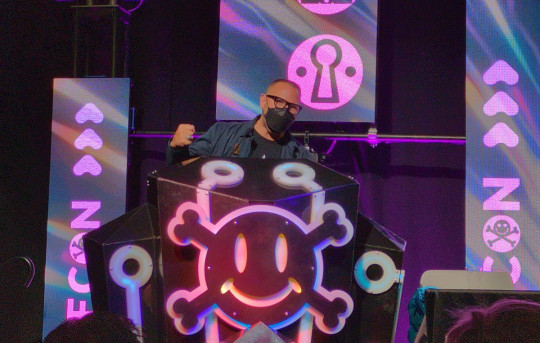
Community voting for SXSW is live! If you wanna hear RIDA QADRI and me talk about how GIG WORKERS can DISENSHITTIFY their jobs with INTEROPERABILITY, VOTE FOR THIS ONE!

If you'd like an essay-formatted version of this post to read or share, here's a link to it on pluralistic.net, my surveillance-free, ad-free, tracker-free blog:
https://pluralistic.net/2024/08/17/hack-the-planet/#how-about-a-nice-game-of-chess

Image: https://twitter.com/igama/status/1822347578094043435/ (cropped)
@[email protected] (cropped)
https://mamot.fr/@[email protected]/112963252835869648
CC BY 4.0 https://creativecommons.org/licenses/by/4.0/deed.pt
#pluralistic#defcon#defcon 32#hackers#enshittification#speeches#transcripts#disenshittify or die#Youtube
904 notes
·
View notes
Text
Take advantage of Azure Cloud Labs to unleash your potential
Are you looking to develop your skills in cloud computing and gain hands-on experience with Microsoft Azure? Then Azure cloud labs are the perfect solution for you. Azure cloud labs allow you to test and experiment with different Azure services in a secure, isolated environment without affecting your production environment.
Azure cloud labs offer several benefits, including:
Hands-on experience: You can gain hands-on experience with different Azure services, allowing you to develop a deeper understanding of how they work.
Cost-effective: You can test and experiment with Azure services without incurring the cost of setting up a full production environment.
Time-saving: You can set up and use an Azure cloud lab in just a few minutes, saving you valuable time.
Safe experimentation: You can experiment with Azure services without affecting your production environment, ensuring that you can test and try new things without any risk.
In conclusion, Azure cloud labs are a valuable resource for individuals and organizations looking to develop their skills and gain hands-on experience with Microsoft Azure. Whether you're just starting out or looking to advance your career, Azure cloud labs can help you unleash your potential and succeed in the cloud computing industry.
#Azure cloud labs#cloud computing#Microsoft Azure#hands-on experience#secure#isolated environment#production environment#cost-effective#time-saving#safe experimentation#individuals#organizations#skill development
0 notes
Note
Can you share what your art-making process is? What software and tools do you use?? I'm falling in love with your work!!
Thank you, I'm so happy you like my work and are interested in the process. The short answer is I mostly use Adobe Animate.
I hate how I'm using an Adobe product (although I still regard it as a MacroMedia Flash product), but there's just no other software that compares to its jankiness. Perhaps it's just my long familiarity with the program, but nothing I've experienced matches how it simultaneously feels like drawing in MS Paint and using Microsoft PowerPoint vector shapes. The result is something that feels in-between the two; handmade yet computer-generated.
Typically, I'll start with a hand-drawn sketch, often beginning as a thumbnail done with pencil and paper.

I'll then do a mix of hand drawing and vector shape tool rendering. I use the Paint Brush tool to hand draw strokes, and the line and shape tools mixed with transform to make more geometrically accurate shapes. The design is rendered into divided closed loop shapes, ready to be filled with a solid. The strokes are kept or removed depending on the design.

These fill shapes are then either coloured and rendered in Adobe Animate, using fills, gradients, or a more complex process of masks and effects.

Alternatively, I'll bring all these vector shapes into Photoshop and use them as clipping masks. The vector shapes act like masking taped areas or shields to maintain sharp edges, while the brush is like an atomized airbrush used to build soft volumed forms.

Please excuse all that horrible Adobe Cloud and AI bloatware...
And there we go!


Variations in the process include just using MS Paint, index color in Photoshop, or 3D programs.


Very old works of mine were almost abstract, just exploring digital mark-making, which was a trend I was following in the mid 2010s that I loved. This kind of stuff.

While my current work uses its digital material specificity as an intermediary to the subject in the illustration.

For example, #ersatz.world parodies clip-art and flash edutainment styles but imagines the characters living within that kind of world. The designs are meant to be cute, easy to read, light in computer processing, but also irreverent, janky, and generic too.

People typically regard this sort of clip art style as ephemeral trash, but I always found them charming. I use Ersatz World primarily as a satire vehicle, parodying educational formats to spoof corporate explainer content and digital media.
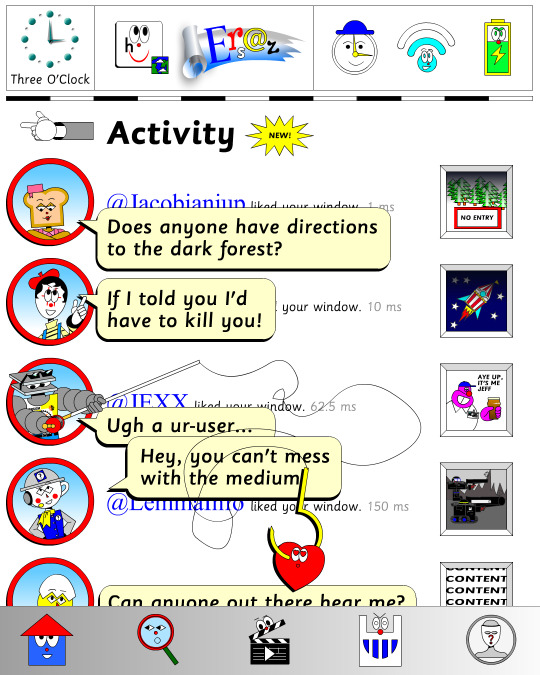
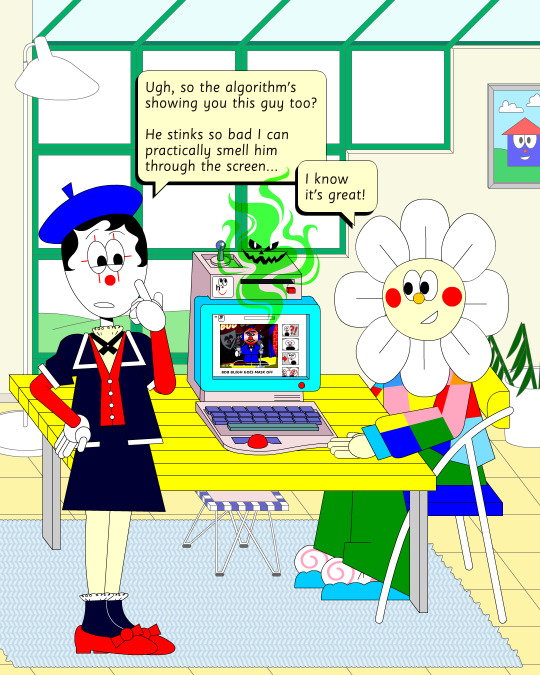

However, part of the problem with Ersatz is I've made it look too polished, complex, and I've grown too attached to the characters, which I imagine is a typical issue with overbuilding a world. So recently, I've made an even jankier Ersatz-like set of characters to play about with, using an even simpler style with less cohesion. I like to try and use slightly different styles and digital material styles to relate to the property at hand.

That’s why #autonymus has a bitmap digital material and a denser feel to it. Unlike Ersatz, Autonymus is not meant to be an overt semi-meta fiction. It’s not exactly pixel art, but the pixels are just about visible, as the intention is to create a digital expressionist depth to the setting. Although it’s still stylized and not realistic to our world, I definitely still want to evoke semblances of our world. That’s why there’s attention to landscape, plant life, and implied life beyond what you see in the frame with the characters, etc. But I'm still making a cartoon, and I still want it to feel at ease with itself being a digital material work. Characters are therefore flat, simple, stiff, and the speech style is like a bad Shakespeare parody. I like to balance between ugly and appealing, simple and complex, familiar and unfamiliar.



In regard to things like inspiration, references, and my relationship to aesthetic genres; these things certainly factor into my work, perhaps I'm even overtly dependent on them. My work can definitely be post-modernist in method; creating new, ironic, or fragmented interpretations through deconstructing a mix of various styles or methods. But at the same time, I'm still trying to make a digital gestural representation where the aesthetic is driven by my relationship to the software and techniques directly—not simply in an attempt to reference a style. For example, I like drawing lines in sweeping strokes, not to a point of geometric perfection, but just in a way where the curves are smooth and simple. But if I want perfectly curved or straight lines, I'll use the vector tools.

Working this way, you can sort of learn why certain styles and design choices in past vector aesthetics were made, as they would have also needed to make similar choices. That’s why I’m more mindful of using digital material specificity as a foundation to build narrative and subjects upon these days.
For example, genre references like cyberpunk clichés for #cyberhell or late medieval design for #autonymus or 2005 to 2015 era subculture fashion for #gradientgoblinz.



I think it’s important to take inspiration and reference from a wide variety of sources, but I think they’d mean nothing without having something to say or express. Autonymus, although it is a collection of tropes and clichés, isn’t just about that. It’s a story about the tensions of socially constructed systems and how that shapes faith, technology, and the natural world, or at least that's what I'm aiming for anyway.
But despite all that, I think there’s a danger of locking myself into the past by using these methods. For example, using nostalgia and references to past aesthetics can result in just recreating the past in a form of role-play. To avoid that, I try and evoke the past through a messy, inaccurate pastiche rather than caring to accurately re-enact anything. I’m probably not always successful at communicating the deliberateness of this, and it can certainly get very frustrating and pedantic. To be honest, I do kind of hate aesthetic labels (terms like Y2K, global coffee house, utopian scholastic designs from a pre-9/11 world).
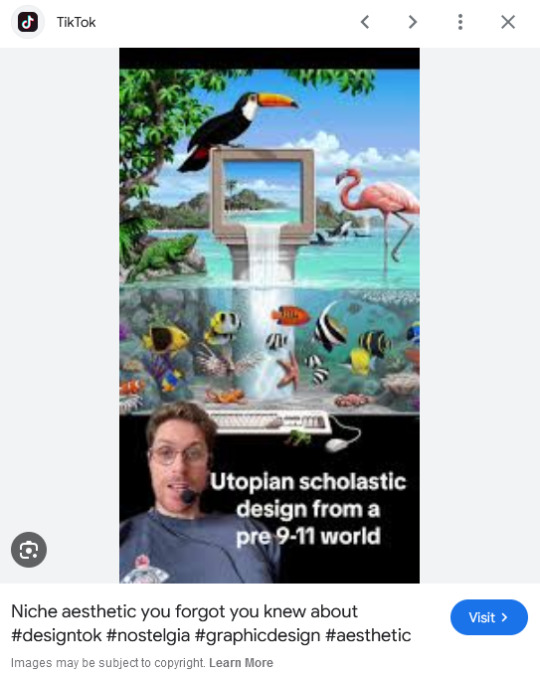
I do not believe that a project aimed solely at mapping history through aesthetic styles is worthwhile. Sure, they can be handy for organizing style trends, but they can also be reductive and ahistoric. Who are these people to define the history of these design eras? The result is a kind of suffocating simulation of design history but removed from context, perfect for moodboardism. I wish it felt more tongue-in-cheek, less absolute of itself in its own practice. Instead, it acts to legitimize and engender those making these labels, almost giving them ownership of the design styles. It’s similar to the logic and process of generative AI and its databases in a way, just done manually.
I’m very inspired by artists like Oneohtrix Point Never in this regard, as I think he’s able to create an aesthetic portal to all kinds of memories, feelings, and worlds reminiscent of the past, while still being in the present. It’s more a reflection of how timelines are messy now, like a memory or dream, rather than an audacity to say the past was actually like that, or to try to actually map some kind of timeline.
I think the benefit of this process is how it avoids the other side of the spectrum—being locked into chasing the cutting edge of digital processes. I don't necessarily think using an old digital process means your work inherits the semiotics of old aesthetics. Non-digital mediums don’t have this issue to this degree, as you can still paint in oils and be considered contemporary, or at least it's not frowned upon to such a degree. And I also don't think anyone in the heyday of Flash ever made work the same as I do, especially as computers are more powerful now so can handle more. I probably shouldn't boast too much about that though, as artists at the time probably just had more sense than to use Flash like a painting program! So then, why is my use of Adobe Animate critiqued as obsolete and an aesthetic dead-end? Because to whose standards is this process obsolete? If you value digital aesthetics as an apparatus in industry practice, then sure, my work is redundant.
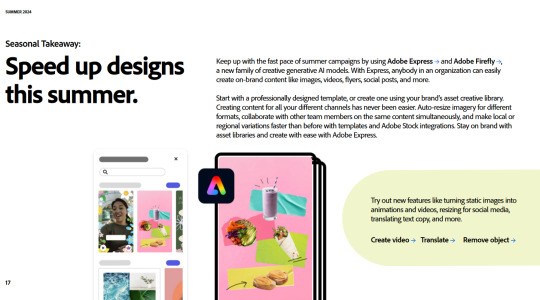
But as wonderful as the latest tech can be in creating new aesthetics, I do feel it can be overtly dependent on the trends and directions of tech corporations, and therefore act as an indirect propaganda tool to their hegemony over digital aesthetics, such as the ever-demanding processing power needed for simulated realism. If anything, work that does follow in the direction of the latest tech trends is ironically the quickest to date once the trends move on.

I've noticed I've not really described what my work is about, just the process, in this text. But I don't know, maybe I like Flash because it is regarded as redundant. No one really cares about it, so I feel free to make whatever I want, and can decide on form myself, to my own standards, the quality of my work. As fun as making images is, I find it difficult to put into words what it is exactly I'm expressing in my work, and perhaps that would spoil it anyway.
218 notes
·
View notes
Text
The main reason to use Firefox and Linux and other free and open source software is that otherwise the big tech monopolies will fuck you as the customer over in search of profits. They will seek to control how you use their products and sell your data. When a company dominates the market, things can only get worse for ordinary people.
Like take Google Chrome for example, which together with its chromium reskins dominate the web browser market. Google makes a lot of money from ads, and consequently the company hates adblockers. They already are planning to move to manifest V3, which will nerf adblockers significantly. The manifest V3 compatible chrome version of Ublock Orgin is a "Lite" version for a reason. Ublock's Github page has an entire page explaining why the addon works best in Firefox.
And Google as we speak are trying to block adblockers from working on Youtube, If you want to continue blocking Youtube ads, and since Youtube ads make the site unuseable you ought to want that, it makes the most sense to not use a browser controlled by Google.
And there is no reason to think things won't get worse. There is for example nothing stopping Google from kicking adblockers off their add-on stores completely. They do regard it as basically piracy if the youtube pop-ups tell us anything, so updating the Chrome extensions terms of service to ban adblocking is a natural step. And so many people seem to think Chrome is the only browser that exists, so they are not going to switch to alternatives, or if they do, they will switch to another chrominum-based browser.
And again, they are fucking chromium itself for adblockers with Manifest V3, so only Firefox remains as a viable alternative. It's the only alternative to letting Google control the internet.
And Microsoft is the same thing. I posted before about their plans to move Windows increasingly into the cloud. This already exists for corporate customers, as Windows 365. And a version for ordinary users is probably not far off. It might not be the only version of Windows for awhile, the lack of solid internet access for a good part of the Earth's population will prevent it. But you'll probably see cheap very low-spec chromebookesque laptops running Windows for sale soon, that gets around Windows 11's obscene system requirements by their Windows being a cloud-based version.
And more and more of Windows will require Internet access or validation for DRM reasons if nothing else. Subscription fees instead of a one-time license are also likely. It will just be Windows moving in the direction Microsoft Office has already gone.
There is nothing preventing this, because again on the desktop/laptop market Windows is effectively a monopoly, or a duopoly with Apple. So there is no competition preventing Microsoft from exercising control over Windows users in the vein of Apple.
For example, Microsoft making Windows a walled garden by only permitting programs to be installed from the Microsoft Store probably isn't far off. This already exists for Win10 and 11, it's called S-mode. There seem to be more and more laptops being sold with Windows S-mode as the default.
Now it's not the only option, and you can turn it off with some tinkering, but there is really nothing stopping Microsoft from making it the only way of using Windows. And customers will probably accept it, because again the main competition is Apple where the walled garden has been the default for decades.
Customers have already accepted all sorts of bad things from Microsoft, because again Windows is a near-monopoly, and Apple and Google are even worse. That’s why there has been no major negative reaction to how Windows has increasingly spies on its users.
Another thing is how the system requirements for Windows seem to grow almost exponentially with each edition, making still perfectly useable computers unable to run the new edition. And Windows 11 is the worst yet. Like it's hard to get the numbers of how many computers running Win10 can't upgrade to Win11, but it's probably the majority of them, at least 55% or maybe even 75%. This has the effect of Windows users abandoning still perfectly useable hardware and buying new computers, creating more e-waste.
For Windows users, the alternative Windows gives them is to buy a new computer or get another operating system, and inertia pushes them towards buying another computer to keep using Windows. This is good for Windows and the hardware manufacturers selling computers with Windows 11 pre-installed, they get to profit off people buying Windows 11 keys and new computers, while the end-users have to pay, as does the environment. It’s planned obsolescence.
And it doesn’t have to be like that. Linux distros prove that you can have a modern operating system that has far lower hardware requirements. Even the most resource taxing Linux distros, like for example Ubuntu running the Gnome desktop, have far more modest system requirements than modern Windows. And you can always install lightweight Linux Distros that often have very low system requirements. One I have used is Antix. The ballooning Windows system requirements comes across as pure bloat on Microsoft’s part.
Now neither Linux or Firefox are perfect. Free and open source software don’t have a lot of the polish that comes with the proprietary products of major corporations. And being in competition with technology monopolies does have its drawbacks. The lacking website compatibility with Firefox and game compatibility with Linux are two obvious examples.
Yet Firefox and Linux have the capacity to grow, to become better. Being open source helps. Even if Firefox falls, developers can create a fork of it. If a Linux distro is not to your taste, there is usually another one. Whereas Windows and Chrome will only get worse as they will continue to abuse their monopolistic powers over the tech market.
830 notes
·
View notes
Text
Consider the ways oil and gas are already entwined with big tech. The foundation of the partnership between Big Tech and Big Oil is the cloud, explains Zero Cool, a software expert who went to Kazakhstan to do work for Chevron and chronicled this in Logic magazine. “For Amazon, Google, and Microsoft, as well as a few smaller cloud competitors like Oracle and IBM, winning the IT spend of the Fortune 500 is where most of the money in the public cloud market will be made”—and out of the biggest ten companies in the world by revenue, six are in the business of oil production. What are oil companies going to do with the cloud? Apparently, Chevron—which signed a seven-year cloud contract with Microsoft—generates a terabyte of data per day per sensor and has thousands of wells with these sensors. They can’t even use all that data because of the scale of computation required. “Big Tech doesn’t just supply the infrastructures that enable oil companies to crunch their data,” explains Zero Cool; they also provide analytic tools, and machine learning can help discover patterns to run their operations more efficiently. This is another reason why Big Oils need Big Tech; they have the edge when it comes to artificial intelligence/machine learning. “Why go through the effort of using clean energy to power your data centers when those same data centers are being used by companies like Chevron to produce more oil?” Zero Cool asks, also noting that one of the main reasons oil companies are interested in technology is to surveil workers.
Holly Jean Buck, Ending Fossil Fuels: Why Net Zero is Not Enough
91 notes
·
View notes
Text
When Microsoft named its new Windows feature Recall, the company intended the word to refer to a kind of perfect, AI-enabled memory for your device. Today, the other, unintended definition of “recall”—a company's admission that a product is too dangerous or defective to be left on the market in its current form—seems more appropriate.
On Friday, Microsoft announced that it would be making multiple dramatic changes to its rollout of its Recall feature, making it an opt-in feature in the Copilot+ compatible versions of Windows where it had previously been turned on by default, and introducing new security measures designed to better keep data encrypted and require authentication to access Recall's stored data.
“We are updating the set-up experience of Copilot+ PCs to give people a clearer choice to opt-in to saving snapshots using Recall,” reads a blog post from Pavan Davuluri, Microsoft's corporate vice president for Windows and devices. “If you don’t proactively choose to turn it on, it will be off by default.”
The changes come amid a mounting barrage of criticism from the security and privacy community, which has described Recall—which silently stores a screenshot of the user's activity every five seconds as fodder for AI analysis—as a gift to hackers: essentially unrequested, preinstalled spyware built into new Windows computers.
In the preview versions of Recall, that screenshot data, complete with the user's every bank login, password, and porn site visit would have been indefinitely collected on the user's machine by default. And though that highly sensitive data is stored locally on the user's machine and not uploaded to the cloud, cybersecurity experts have warned that it all remains accessible to any hacker who so much as gains a temporary foothold on a user's Recall-enabled device, giving them a long-term panopticon view of the victim's digital life.
"It makes your security very fragile,” as Dave Aitel, a former NSA hacker and founder of security firm Immunity, described it—more charitably than some others—to WIRED earlier this week. “Anyone who penetrates your computer for even a second can get your whole history. Which is not something people want.”
In addition to making Recall an opt-in feature, Microsoft’s Davuluri also writes that the company will make changes to better safeguard the data Recall collects and more closely police who can turn it on, requiring that users prove their identity via its Microsoft Hello authentication function any time they either enable Recall or access its data, which can require a PIN or biometric check of the user’s face or thumbprint. Davuluri says Recall’s data will remain encrypted in storage until the user authenticates.
All of that is a “great improvement,” says Jake Williams, another former NSA hacker who now serves as VP of R&D at the cybersecurity consultancy Hunter Strategy, where he says he's been asked by some of the firm's clients to test Recall's security before they add Microsoft devices that use it to their networks. But Williams still sees serious risks in Recall, even in its latest form.
Many users will turn on Recall, he points out, partly due to Microsoft’s high-profile marketing of the feature. And when they do, they’ll still face plenty of unresolved privacy problems, from domestic abusers that often demand partners give up their PINs to subpoenas or lawsuits that compel them to turn over their historical data. “Satya Nadella has been out there talking about how this is a game changer and the solution to all problems,” Williams says, referring to Microsoft's CEO. “If customers turn it on, there’s still a huge threat of legal discovery. I can’t imagine a corporate legal team that’s ready to accept the risk of all of a user’s actions being turned over in discovery.”
For Microsoft, the Recall rollback comes in the midst of an embarrassing string of cybersecurity incidents and breaches—including a leak of terabytes of its customers' data and a shocking penetration of government email accounts enabled by a cascading series of Microsoft security slipups—that have grown so problematic as to become a sticking point given its uniquely close relationship with the US government.
Those scandals have escalated to the degree that Microsoft's Nadella issued a memo just last month declaring that Microsoft would make security its first priority in any business decision. “If you’re faced with the trade-off between security and another priority, your answer is clear: Do security,” Nadella's memo read (emphasis his). “In some cases, this will mean prioritizing security above other things we do, such as releasing new features or providing ongoing support for legacy systems.”
By all appearances, Microsoft's rollout of Recall—even after today's announcement—displays the opposite approach, and one that seems more in line with business as usual in Redmond: Announce a feature, get pummeled for its glaring security failures, then belatedly scramble to control the damage.
20 notes
·
View notes